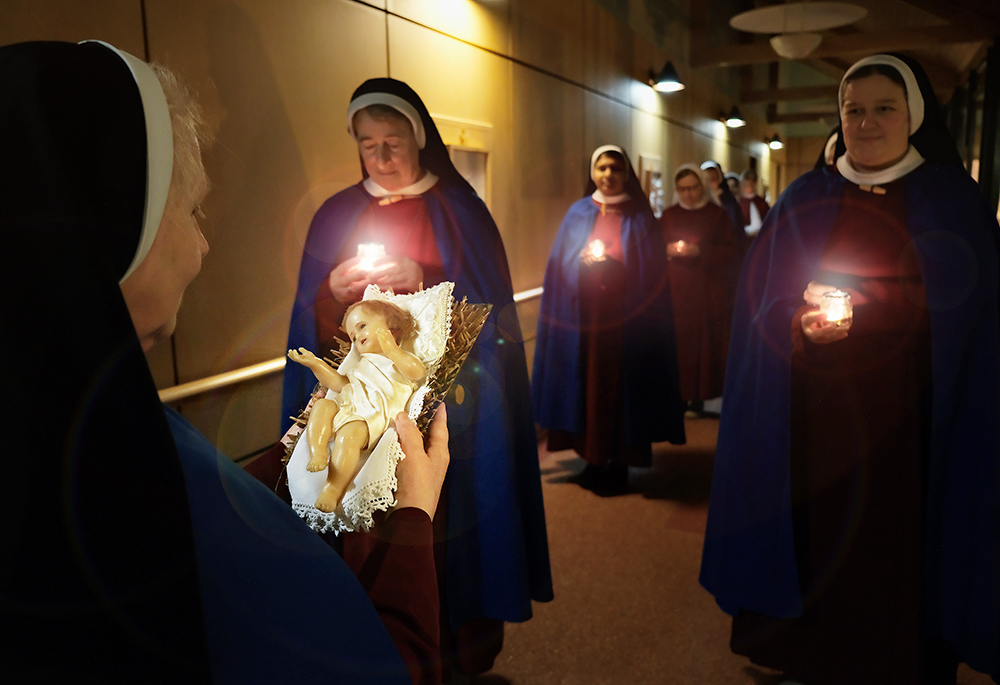
On Christmas Eve a candlelight procession carries the Child Jesus through every corner of the Sisters of the Most Holy Redeemer in Dublin, Ireland, where he is reverently welcomed with a kiss — a moving preparation for the Christmas vigil. (Courtesy of Angela Cameron)

Throughout the Christmas season, religious communities around the world celebrate traditions that draw them closer to the mystery of the Incarnation. Through rituals and cultural celebrations, they reflect on the joy and hope that the season brings.
For this month's panel, we asked our participants: Does your congregation have any special or unusual Advent or Christmas customs? Are there any that are characteristic of your country/culture?
It's inspiring to see the spiritual richness that shapes our ministries and communities during this holy season.
Wishing you all a blessed Christmas and a joyful New Year!
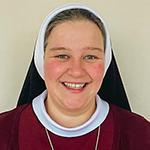
Angela Cameron is a contemplative nun of the Order of the Most Holy Redeemer (Redemptoristines), based in Dublin. Originally from Scotland, she holds a master's degree in theology with a focus on spirituality. As a Redemptoristine, her charism is to embody the living memorial of God's redemptive work through Christ. She is dedicated to a life of union with Christ, expressing her vocation through love, service and deep contemplative prayer. Engaging in silent prayer and praise, she lives out the Redemptoristines' mission of reflecting Christ's paschal mystery in everyday life.
Every 25th of the month, we Redemptoristine nuns celebrate "little Christmas," a joy-filled reminder of the Incarnation. With a special liturgy, the baby Jesus takes pride of place in our refectory, and each sister renews her vows to God. On Christmas Eve a candlelight procession carries the Child Jesus through every corner of our monastery, where he is reverently welcomed with a kiss — a moving preparation for the Christmas vigil, and it has been on my mind lately.
We recently voted here in Ireland and a new government has been elected. It was my first time voting in this country, so I had much research and "forming of my conscience" to do.
I was deeply struck by the campaign message of one of the groups: "Ireland is full!" Basically, "There's no room at the inn!" No room for migrants. No room for refugees. No room for God, perhaps, even. Anti-immigration sentiment is growing in many parts of our world as we seek to defend our territories and livelihoods, living in fear of what is different, unknown and out of our control!
But Ireland is the land of "a hundred thousand welcomes": Céad Míle Fáilte. A land where the stranger is welcomed, the neighbor cherished. Can we see in this change in attitude the consequences of a certain dechristianization of this ancient land of saints?
Advertisement
Of course, not all Irish people feel this way, just as not everyone in other parts of our globalized world facing an influx of migrants share this sentiment. Many migrants are fleeing their homelands in fear for their lives, seeking peace and stability for their families.
As an international monastic community, this challenges us in many ways. We are called to check how open our hearts are to one another, valuing that which is different but also that which unites us at our deepest core. Today, more than ever, our world needs this witness to unity. Living the daily challenges of life together and praying in silence and in the liturgy together, we gradually come to know more and more deeply that we are truly one with each other — united not just by our charism or faith but also by our shared humanity.
The Advent liturgy calls us to recognize the deep longings within us — the same longings shared by people of all ages and times. These are also the longings migrants and refugees carry in their hearts as they set out for foreign lands, often with little or nothing, facing danger and threats.
Is it too much to ask that we welcome them with the same reverence we offer the Christ Child?
Wishing you all (and myself) hearts full of "a hundred thousand welcomes" this Christmas.
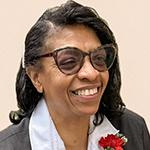
Betty A. Harbison is a newly professed member of the Sisters of Social Service of Los Angeles, a convert to Catholicism, and a retired 38-year veteran English teacher, writer, singer and artist. She holds a bachelor's degree in English and a Master of Science in education from the University of Southern California. She now serves as an education specialist at a shelter for battered and homeless women and their families. She fully embraces the challenge and blessing of working with children and adults in an ever-changing environment. She listens attentively to both parents and children, helping them pursue academic goals and personal excellence, while offering guidance for a fresh start and support in their educational journeys.
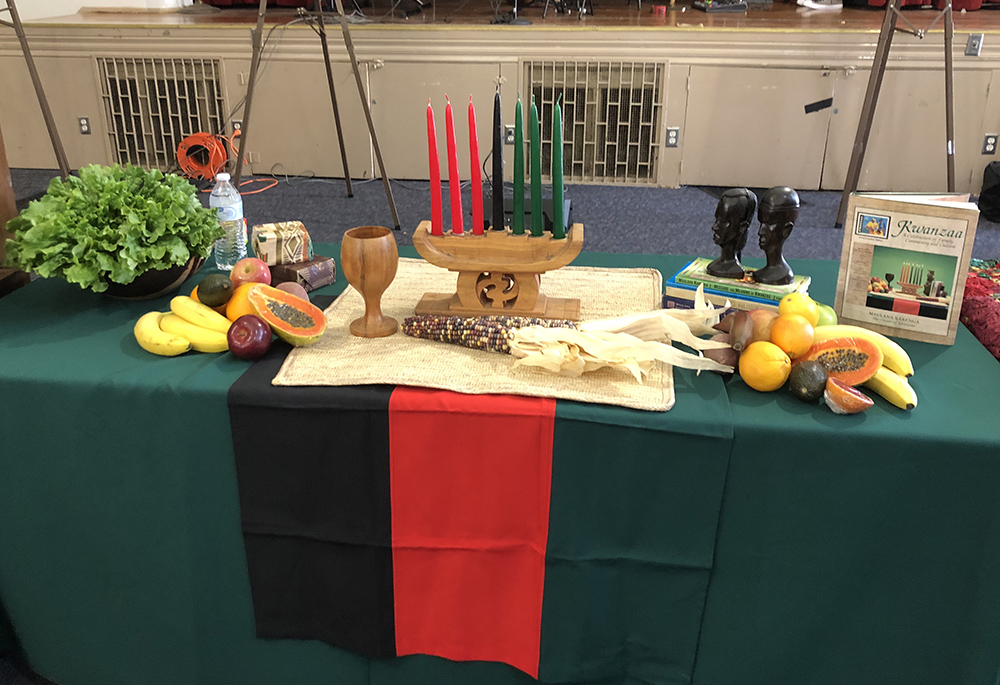
A Kwanzaa display is pictured at the Jefferson Branch Library in December in Pasadena, California, during an annual Kwanzaa celebration hosted by the Pasadena Alumnae Chapter of Delta Sigma Theta Sorority Inc. (Betty A. Harbison)
One great benefit of converting to Catholicism is gaining a Christmas season for relishing, relaxing and reflecting, more than the secular climax of one day. Dec. 25 begins our special celebration of promise, "Emmanuel — God with us" today and forever.
As my community seeks to embrace our multiculturalities in intercultural ways, I delight this year in presenting portions of an observance new to ethnically diverse Sisters at one of our houses — Taiwanese, French, Mexican and Filipina American! From Dec. 26 to Jan. 1, a cultural event unique to African Americans in the United States is celebrated— Kwanzaa, honoring family, heritage and community values.
Each of the seven days is devoted to an African cultural value, celebrated in order as the Nguzo Saba (Seven Principles) : Umoja (Unity), Kujichagulia (Self-Determination), Ujima (Collective Work), Ujamaa (Cooperative Economics), Nia (Purpose), Kuumba (Creativity) and Imani (Faith).
Maulana Karenga conceptualized Kwanzaa in Los Angeles in 1966, using Swahili to highlight African cultural values and promote the well-being of African people and humanity.
Following the tradition of other African harvest celebrations, African Americans and members of the African diaspora gather to reverence the Creator, share history, enjoy readings, art, dance and music, and reflect on their highest cultural values. The day often concludes with a communal meal.
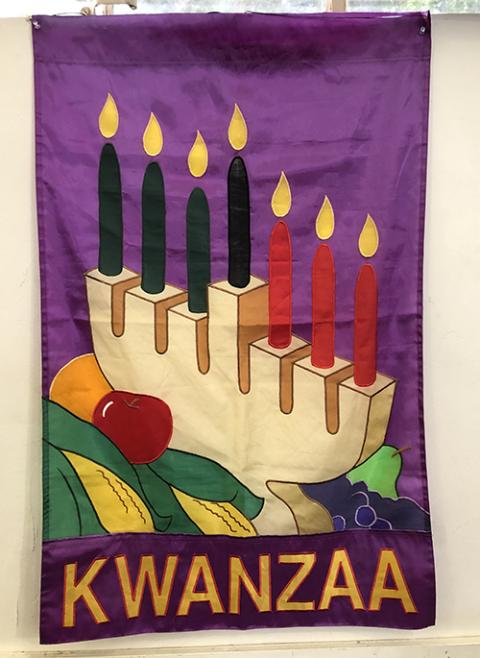
A Kwanzaa display at the Jefferson Branch Library in December, in Pasadena, California (Betty A. Harbison)
In Swahili, a "Call and Response" begins each gathering: "Habari gani?" ("What is the news?"), followed by the principle of the day and warm exchanges of "Heri za Kwanzaa!" ("Happy Kwanzaa!") Decorations, rich in symbolism, are also important. The Mkeka (woven mat) symbolizes the foundation of tradition and history. The Kinara (candleholder) represents our African roots, and the Mishumaa Saba (seven candles) represent the seven principles in Pan-African flag colors, with red for struggle, black for the people, and green for hope. Other items include Mazao (crops), Kikombe cha Umoja (Unity Cup), Muhindi (corn symbolizing children), and Zawadi (gifts). On the closing day, Zawadi, gifts with cultural significance, are often given to children, such as books.
Kwanzaa has spread across the U.S., to other countries, and back to Africa. This year, I hope to refill my sisters' hearts through evening rituals involving the arts, food and fellowship — sharing culture, history and communal values to usher in 2025, following Advent's preparation and Christmas' fulfillment.
I am keeping my Christmas heart open, refilled by exploring a full gamut of cultural celebrations and religious festivities this entire Christmas season. As Charles Dickens' Scrooge vowed, "I will honour Christmas in my heart, and try to keep it all the year."
Merry Christmas, "Kwanzaa yenu iwe na heri!" ("May y'all's Kwanzaa be with happiness!") And, as Dickens wrote, "God bless us, every one!"
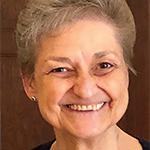
With a rich background in theology and psychology, Carrie Miller holds a master's in Christian spirituality from Creighton University and a master's in counseling psychology from Angelo State University. Initially formed with the Franciscan Sisters of Mary Immaculate, she transferred to the Sisters of the Living Word in 1980, where her passion for reflective writing and creative prayer began. Over the years, her ministries have spanned family ministry, trauma healing, ecumenical collaboration, and co-founding Families Forward, an outreach program for homeless families. After serving in community leadership from 2018 to 2023, she remains active in "extended leadership," immigrant support, environmental advocacy and spiritual direction.
La Posada — The Inn — is a Mexican Advent tradition that holds significant meaning for us today. Over 2,000 years ago, Joseph and Mary, expecting a child, journeyed from Nazareth to Bethlehem for the census. Upon arrival, they sought shelter, going from door to door. However, as they knocked on the door of each posada (inn), they repeatedly heard: "There is no room for you here."
In light of the recent U.S. national elections and plans for massive deportations, our Advent cry became all the stronger: "Come, Emmanuel, with the dawning of a new day of justice!"
As the Holy Family sought a place to stay, so too, in our time — Dec. 13, 2024, in the sanctuary city of Chicago — over 200 people gathered in procession, seeking an open door to a posada. We walked and prayed for the 19th consecutive year in solidarity with our immigrant sisters and brothers who have been knocking on the doors of our government for legislative shelter, year after year. We prayed they would no longer get the response Joseph and Mary did: "There is no room for you here."
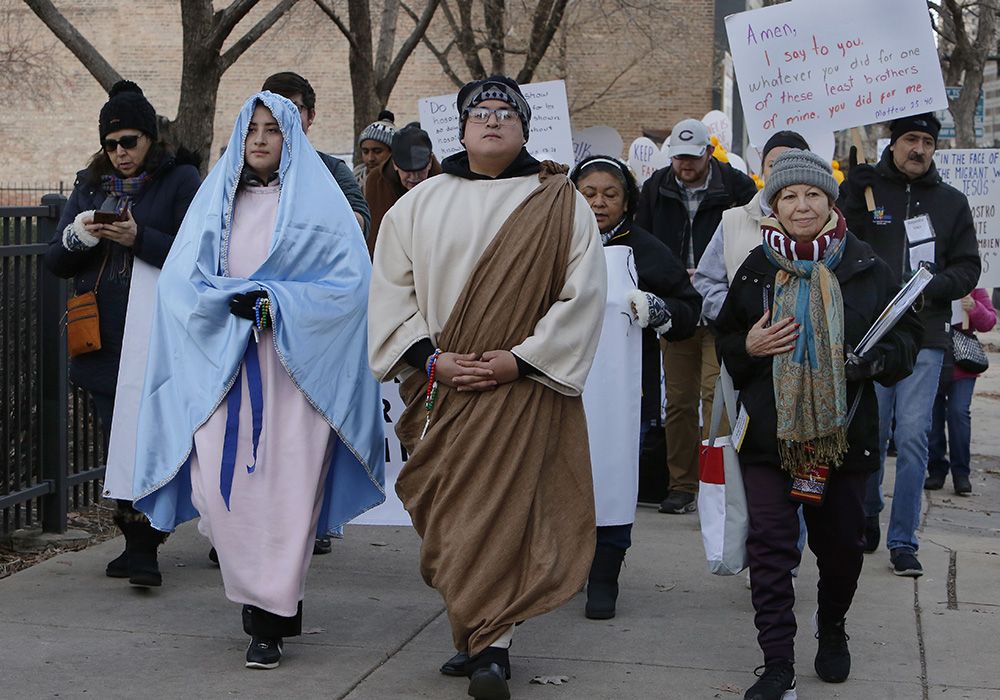
Participants joined the 19th Annual Posada Seeking Immigration Reform, organized by the Archdiocese of Chicago's Office of Human Dignity and Solidarity-Immigration Ministry, on Dec. 13. The one-mile procession began at the U.S. Citizenship and Immigration Services Center in Chicago, stopping at key locations before concluding at Old St. Patrick's Church. Pictured are participants of the event in 2023. (Courtesy of the Archdiocese of Chicago)
The procession brought together members of religious communities, Pastoral Migratoria, Sisters and Brothers of Immigrants, Priests for Justice for Immigrants, parishioners, volunteers who assist immigrants, and immigrants themselves. Our procession walked through downtown Chicago, making stops to pray and symbolically "knock on the doors" of significant buildings because of what they represent:
- The federal building, representing the flawed legislative process to achieve immigration reform;
- An education center, representing universities wanting to welcome Dreamers and recipients of the Deferred Action for Childhood Arrivals program but bound by restrictions and laws limiting scholarship funds;
- A correctional facility, indicating the current, distressing detention situation.
Through a reading or story at each posada, we heard the dreaded response: "There is no room for you here."
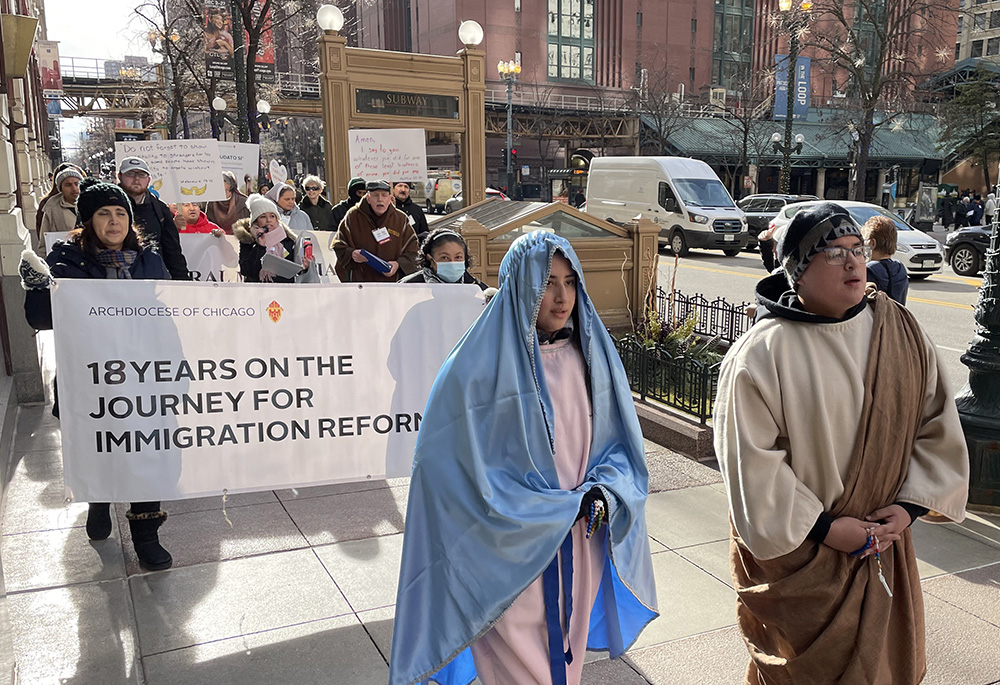
Participants of the 18th Annual Posada Seeking Immigration Reform continue their procession in 2023 in Chicago. (Courtesy of the Archdiocese of Chicago)
Our procession continued, praying for families devastated by raids and deportations, lamenting the separation of families, and lifting up the undocumented who live in fear and uncertainty. We prayed that leaders in our country and leaders of all faiths work together with a common wisdom toward compassionate immigration reform.
Our final stop was a church representing faith communities standing with migrants. At St. Patrick's we found an open door, symbolizing that justice and hospitality require only an open mind and a merciful heart! We entered joyfully in song, renewed our commitment to just immigration policies, and celebrated together.
Truly, through this Posada, we witnessed hope for "a dawning of a new day," when more doors — of hearts and laws — will open to provide legislative shelter.
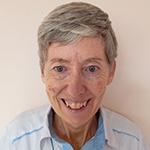
Nuala Doherty, a member of the Franciscan Missionaries of St. Joseph from the U.K., has spent the past 17 years serving as a parish sister in Ecuador, South America. Her ministry includes preparing catechists, leading eucharistic services and prayer groups, visiting the sick, and offering informal English lessons. Prior to her work in Ecuador, she served as a parish sister in the U.K. for two years and taught primary and secondary education in Kenya for three years. Through her diverse roles, she is dedicated to fostering faith and community wherever she is called.
Ecuador is a country full of religious devotions, and the most popular way to prepare for Christmas is through a novena. My first experience of an Ecuadorian novena was in a built-up barrio called Colinas del Norte, about an hour outside Quito by bus. A group of us from the parish went to a different house each night. Families were delighted to have people from the church pray in their homes and would invite all their neighbors, some of whom possibly would not set foot in a church. It was a great way to build community and evangelize.
On the fifth day of the novena, though, they did something a little differently: "Joseph" would knock on the door of five houses, asking for lodging for his pregnant wife and himself through a song. The first four houses would refuse to let them in, giving various excuses for not opening their doors, but at the fifth house, Joseph sang:
Ábranos la puerta, dénos un rincón, (Open the door, give us a corner,)
¿No sabe que lleva mi esposa al Señor? (Do you not know that my wife is carrying the Lord?)
And the people in that house would reply:
¿Por qué no lo dijo cuándo nos llamó? (Why didn't you tell us when you called?)
¡Pasen caminantes que aquí sobra amor! (Come in wayfarers, here there is more than enough love!)
This was referred to as Pase del Niño (the Welcoming of the Child).
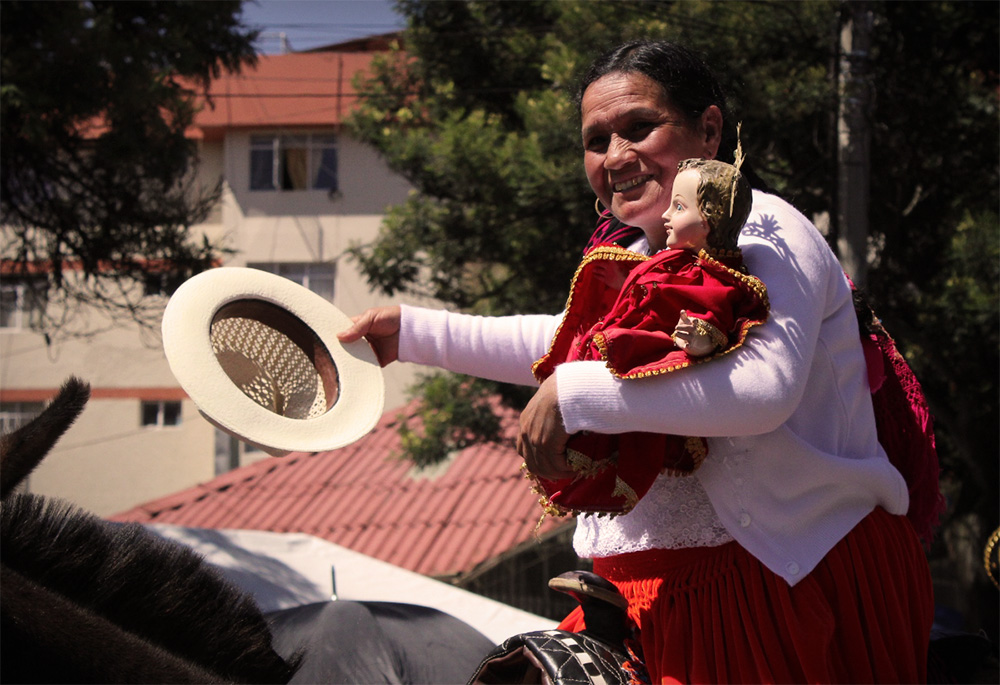
A woman is pictured with a reproduction of the image of the Niño Viajero (Traveling Child), during the 2013 Pase del Niño Viajero in Cuenca, Ecuador. (Wikimedia Commons/Jfbeltranr, CC BY-SA 4.0)
Then, on Dec. 24, families would flood the church to attend Mass, many of them carrying a statue of the Child Jesus, varying in size and placed on either a little plate or in a lovely basket, depending on their economic means. All were majestically adorned in beautiful gowns. The people brought them to receive a blessing, believing that the Child Jesus would protect them from all harm and danger for the coming year.
Similar to the U.K., most houses and churches display a Nativity scene, but the difference here in Ecuador is that many more items are added — people, houses, streams, and animals of all kinds. One Christmas, I even saw tiny baby clothes hanging on a line. How beautiful! Some people's creativity is amazing. Every year, the Church of St. Francis in Quito invites people from all over Ecuador to create their own cribs, which are displayed for a month during Christmastide. The exhibition is quite magnificent.
From Dec. 24 onward, more elaborate Pases del Niño are celebrated in many parts of Ecuador. They take the form of parades through the streets of towns and cities with representations of the Nativity scene, music and dance. Different cultures add their own characters, native costumes and customs.
¡Que viva el Niño Jesús! May the Child Jesus shine in our hearts this Christmas!
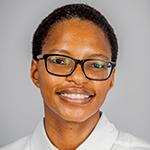
Pulane Makepe, a Sister of the Cross and Passion, made her perpetual profession of vows in June 2024. She is currently appointed to steward community affairs while living in an intergenerational community in Botswana. In addition to her community responsibilities, she is actively involved in ministry at the local parish and collaborates with other women religious and laypeople to address climate change issues. She also serves as the Botswana facilitator for a continent-wide project focused on the renewal of religious life for African women religious.
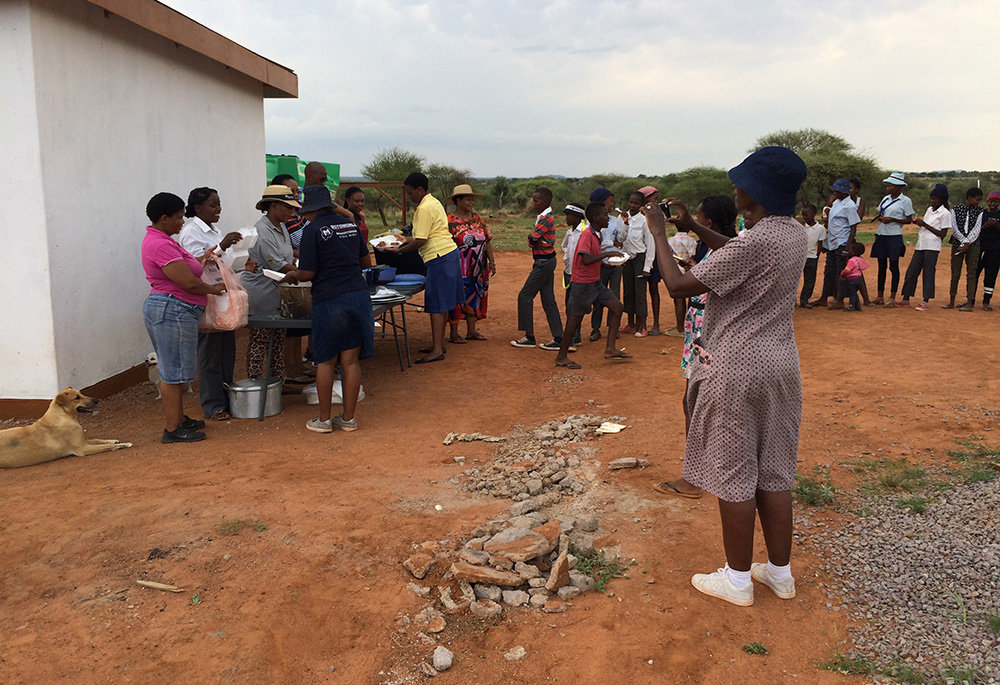
Guests enjoy a festive Christmas lunch featuring typical "keresemose" food at the annual "Keresemose kwa Masimong" ("Christmas in the Fields") celebration, hosted by the sisters and volunteers for the rural community. (Courtesy of Pulane Makepe)
There are no specific cultural traditions associated with the season of Advent in Botswana. The understanding is that it is a time of preparation — spiritually, physically, emotionally, and socially — for Christmas. Christmas is a big end-of-year gathering for most families, friends and neighbors. However, most parishes in the cities and towns would have noticeably smaller congregations at Christmas Eve and Day Masses.
There was one point in my childhood when we made it to an international radio news broadcast, which always highlighted interesting facts or cultural trends during the Christmas season from different places around the world. The presenter asked:
"Did you know that at Christmas time in Botswana, you will barely find anyone in the capital city, Gaborone? It's the only place where nearly everyone leaves town and goes out to the country!"
At the time, I didn't realize that, but my sister and I paid attention in the days before Christmas Eve that year — and that's more or less what we noticed too!
That doesn't happen anymore, but I believe the reason back then was simple: Gaborone wasn't "home" for most people born before then, and the Christmas season is the time of the year for the largest family gatherings, so everyone "went home" to their villages.
My community of sisters has hosted an annual Christmas party for a rural community near where we are based, and the most memorable "Keresemose kwa Masimong" ("Christmas in the Fields") party of now distant memory was when we, along with volunteers, packed pre-organized combo meal packs for 15 of the neediest families with the most children to help carry them through the January back-to-school rush.
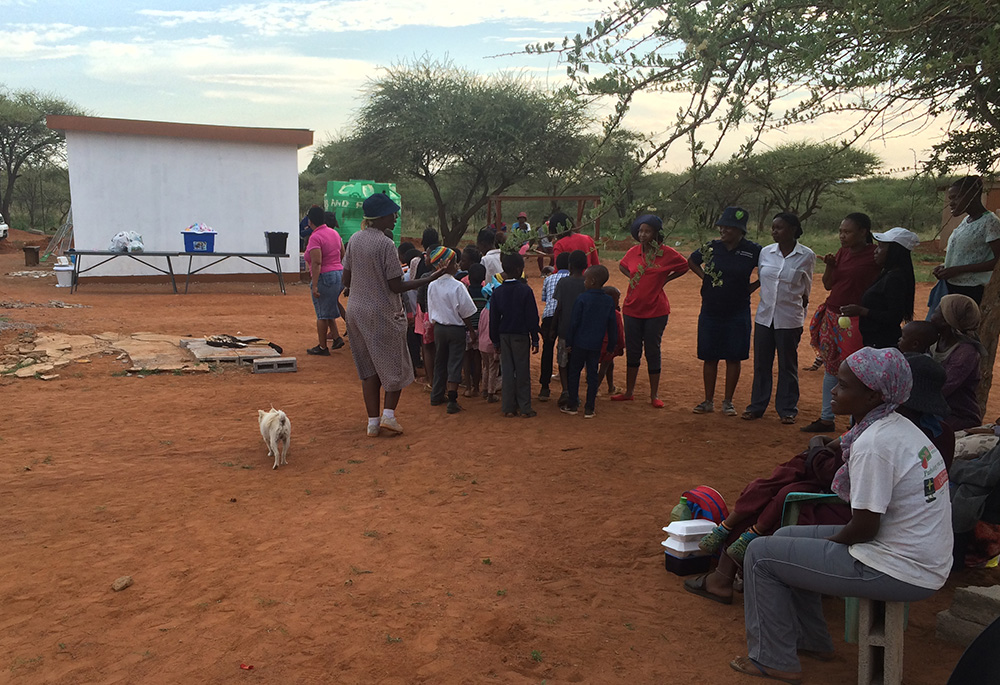
The children's choir, joined by volunteers and sisters, performs an outstanding rendition of traditional Christmas songs during the "Keresemose kwa Masimong" ("Christmas in the Fields") celebration. (Courtesy of Pulane Makepe)
We also packed gift bags of snacks and favors for all the children and parents. Everyone enjoyed the Christmas lunch of typical keresemose food later in the afternoon. After lunch there were fun and games, particularly the traditional choir competition in which alternating choirs performed.
One choir was composed of children, from toddlers to teenagers, with a couple of volunteers and sisters joining them, and the other choir was made up of parents, with support from one of the sisters and a volunteer. That year, the children's choir had a landslide victory, which brought much happiness, and everyone ended by singing a popular Setswana Christmas hymn that welcomes the birth of the longed-for Christ Child, God's promise to the people.
As I think of them departing for their homes with their gifts, carrying the joy of that special day, I'm reminded that we live in a world where millions of families are unable to gather kwa masimong (in the fields) or at their family homesteads to express their joy, love and resilient hope by being together because of conflict, disasters due to climate change, and forced migration. Yet, these memories of human connection and shared community can give them assurance and a confident awareness of a faithful presence in every moment of their lives.




